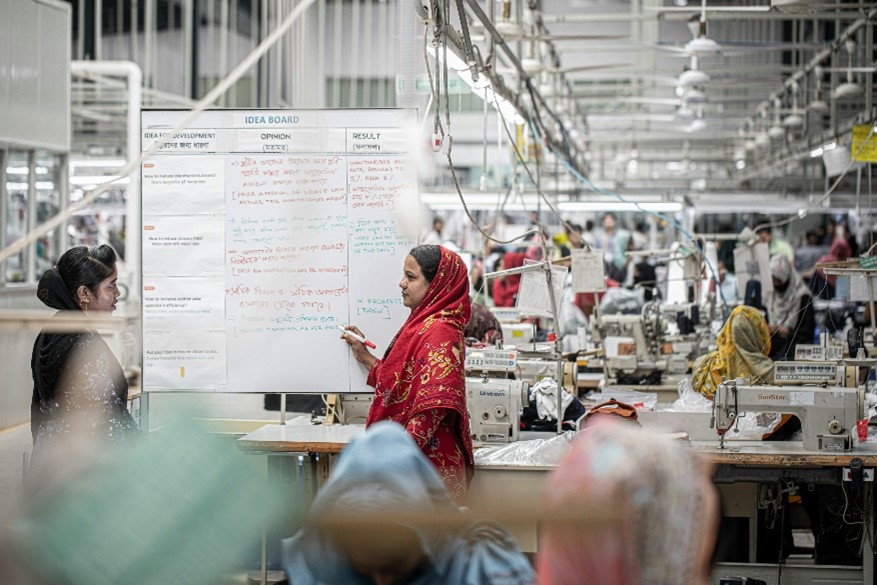
How does violence come to define the factory floors in Bangladesh that produce clothing for Western consumers? More importantly, why has such brutality become normalised and who stands to gain from it? In my recent article, published in the Journal of Management Studies, I explore these questions by introducing the concept of the infernal place: “A workplace where stakeholders brazenly discard human rights while deploying violence to subjugate the bodies and spirits of marginalised workers.”
This blog post unpacks how these infernal places take root and persist within global supply chains and what must be done to dismantle them.
Western Retailers: The Architecture of Exploitation
The fast fashion industry is built on a foundation of relentless exploitation. Western retailers wield disproportionate power, demanding ultra-cheap high-quality goods delivered at impossible speeds. Many perceive themselves as superior, treat manufacturers and by extension workers in the Global South as expendable and disposable. These neo-colonial attitudes were starkly exposed during the COVID-19 pandemic when brands abruptly cancelled orders without compensation or demanded steep discounts, pushing already precarious factories to the brink. As one Bangladeshi factory owner lamented: “We must deliver the King’s demands.” Another admitted: “If this continues, I’ll be forced to shut down my factories.”
The human cost of this exploitation is devastating – workers driven into hunger, eviction and even death. One harrowing testimony revealed a woman worker who lost her father after she could not afford an oxygen cylinder during COVID-19: “If only I’d been paid my rightful wages, I might have saved him.”
Despite public condemnation, Western retailers continue to source from factories implicated in forced labour including those in China’s internment camps for Uyghur Muslims. Such complicity is systematic. Worse still, the looming threat of punitive tariffs proposed by Donald Trump and the silence of major US retailers signals that any fallout will again be borne by workers in Bangladesh and the wider Global South.
Tyranny at Home: Local Violence and Political Impunity
Bangladesh’s vulnerability to global exploitation is intensified by structural issues: endemic poverty, climate shocks and a largely unskilled labour force. Add to this India’s inequitable control of transboundary rivers, restricting water flow during the dry season and releasing water during monsoons which devastates agriculture, fishing and rural livelihoods. This unchecked transboundary aggression amplifies migration into garment work, creating a labour pool primed for abuse.
Layered atop this is a neo-authoritarian political system. Since independence, governments led by the Awami League (AL) and the Bangladesh Nationalist Party (BNP) have weakened democratic institutions through corruption, constitutional manipulation and the politicisation of the judiciary, police and civil service. Press freedoms have been curtailed, dissent criminalised and civil society suppressed through state-sanctioned brutality.
This normalisation of violence enables factory owners, many aligned with ruling elites, to operate with impunity. In this climate, wage theft, below-subsistence pay, forced labour and violent union suppression have become commonplace. Factory managers, industrial police and ruling party loyalists act as enforcers, silencing worker resistance and defending the status quo.
The violence seen in Bangladeshi garment factories is not incidental. It is a deliberate system, engineered to sustain profit by dehumanising labour. These infernal places are not local aberrations but global outcomes. Western corporations, Bangladeshi manufacturers and authoritarian regimes all benefit from a business model that rewards brutality. Factories become the physical embodiment of neoliberal violence, where profit eclipses dignity and exploitation is rebranded as “economic development” or “women’s empowerment”.
A Way Forward: Dismantling the Infernal Place
Legally Mandate Ethical Sourcing and Transparency – Western governments must pass binding legislation to hold retailers accountable for precarious and violent labour conditions in their supply chains. This includes mandatory public disclosure of suppliers, independent audits under the supervision of the UN or ILO and meaningful penalties for sourcing from violent factories. Products linked to forced labour including those made with Uyghur Muslims’ involvement must be unequivocally banned and sanctioned.
Mobilise Consumer Power – Consumers in the Global North wield transformative power. By boycotting exploitative brands and supporting ethical, sustainable or second-hand alternatives they can shift market dynamics. Movements like #WhoMadeMyClothes or #PayUp exemplify that consumer action can create real pressure. The message is clear: “Exploitation must stop.”
Embed Democracy in Governance and Workplace – Following the fall of authoritarian rule, Bangladesh faces a rare opportunity for renewal. Democratic reform must extend beyond elections into the workplace. Workers must have the right to fair wages, to organise and to speak without fear. At the national level, restoring press freedom, judicial independence and electoral integrity is essential. Without political democracy, economic justice will remain elusive.
Empower Students as Catalysts for Change – Historically, Bangladeshi students have been at the forefront of democratic transformation. Today’s youth must rise again demanding transparency, advocating for garment workers and building platforms for truth and resistance. Real change will not descend from above; it must be forged by those bold enough to dream differently.
Let this piece serve as a call to action for policymakers, corporations and citizens alike. Infernal places must be dismantled. Not tomorrow. Today.

Well spotted the ever harsh reality in respect to the brutality “violence” evidence in the fast fashion industry from the developing and least developed economies context at the right time. Well done! Keep it up